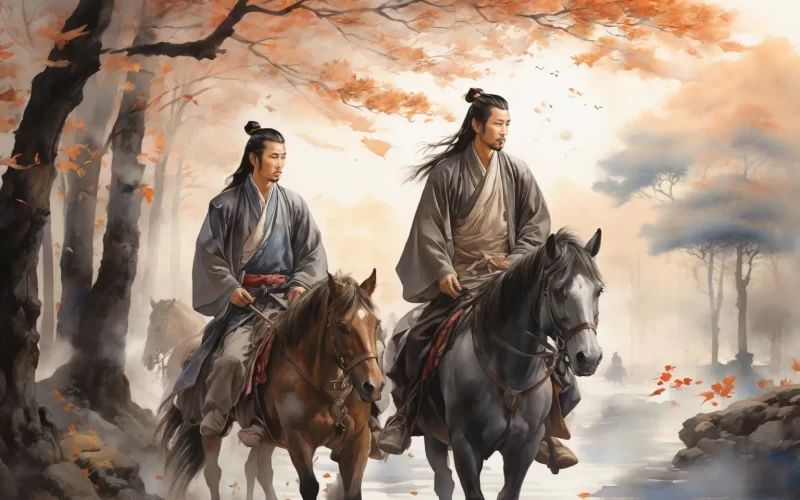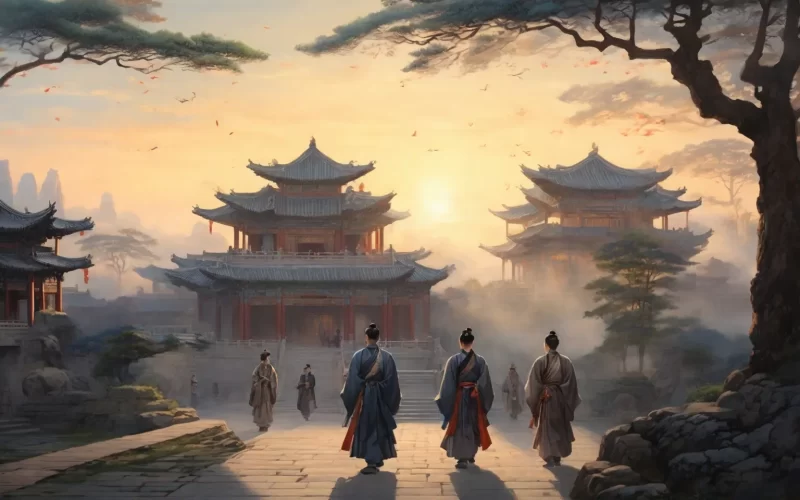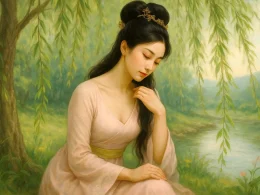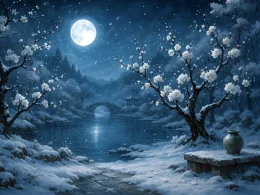It's a long way home, a long way east.
I am old and my sleeve is wet with tears.
We meet on horseback. I have no means of writing.
Tell them three words: "He is safe."
Original Poem:
「逢入京使」
岑参
故园东望路漫漫, 双袖龙钟泪不乾。
马上相逢无纸笔, 凭君传语报平安。
Interpretation:
In the year 749 AD (the eighth year of the Tianbao era), Cen Can (岑参) set foot on the road to the Western Regions for the first time, heading to serve in the military headquarters of Gao Xianzhi, the Governor of Anxi. This poem was composed during his journey westward. At that time, Cen Can was full of ambition, eagerly heading to the frontier, hoping to achieve success in the Western Regions. However, the closer he got to the border, the further he was from his hometown, and the stronger his longing for his family and friends in Chang’an became. In this state of mind, he happened to meet an envoy returning to the capital. In their brief encounter, Cen Can poured all his longing and affection into this short poem.
Upper Couplet:“故园东望路漫漫,双袖龙钟泪不乾。”
Looking east toward my homeland, the road stretches endlessly; my sleeves are drenched with tears, which I cannot wipe dry.
These lines express the poet’s deep homesickness. As he travels westward, farther and farther from Chang’an, his longing for home and loved ones grows heavier. Faced with the long road home and the slim hope of returning, sorrow overwhelms him, and his sleeves are soaked with tears. "Looking east" highlights his constant longing, while "drenched sleeves" vividly depicts his tear-streaked state, making the emotions powerfully felt. The homesickness is genuine, heartfelt, and flows naturally from the lines.
Lower Couplet:“马上相逢无纸笔,凭君传语报平安。”
Meeting briefly on horseback, without pen or paper, I entrust you to carry a message home: tell them I am safe.
These lines describe the chance encounter during his journey. Meeting a returning envoy on horseback, the poet feels a surge of emotion and wishes to write a letter home immediately. However, the hurried travel and lack of writing materials leave him no choice but to entrust a verbal message to the envoy. The phrase "entrust you to carry a message" is plain and simple, yet brimming with deep affection. This fleeting moment on horseback condenses all the poet’s complex feelings of homesickness and longing into a single phrase — unpretentious yet full of lasting emotion.
The entire poem unfolds from this chance encounter, gradually building through images of "looking east," "tear-streaked sleeves," "brief meeting," and "entrusted message." It vividly portrays Cen Can’s longing for home and the hardships of his journey to the border. The emotions are twofold: a deep yearning for loved ones, and a sense of unease about the uncertain future. It is precisely because the scene comes from real life that the poem feels so deeply moving. The language is plain, but the emotions are rich, making it deeply affecting.
Overall Appreciation:
This poem, drawn from a real-life encounter with a returning envoy, uses simple and natural language to vividly capture the poet’s deep homesickness. The first couplet expresses his sorrow as he gazes eastward toward his distant home; the second couplet conveys the excitement and urgency of his brief meeting with the envoy. The language is straightforward, the emotions sincere, and the four lines paint a poignant picture of longing and helplessness. Though heading west to pursue military glory, Cen Can’s heart remains tied to his family and friends in Chang’an. This blending of tender affection and heroic ambition makes the poem particularly moving.
Writing Features:
- Small scenes reflect grand emotions: A brief encounter reveals the poet’s profound homesickness, intensely real and heartfelt.
- A blend of narrative and emotion: The narrative of the journey and the chance meeting intertwines with sincere homesickness, layering the emotions.
- Colloquial expressions: The language is natural and unpolished, like an emotional outburst on horseback, enhancing its authenticity.
- Mingling of ambition and tenderness: The poem balances the hero’s desire for military success with tender feelings for his distant family, blending strength and sensitivity.
Insights:
This poem teaches us that the most moving works often stem from the most authentic feelings in life. During his westward journey, Cen Can captured a fleeting encounter and a simple verbal message, transforming them into a poem that expresses the countless emotions of a traveler far from home. It reminds us that tenderness and ambition are not contradictory — a true hero, even while pursuing glory on the frontier, still looks back toward home and cherishes loved ones. Such delicate, sincere emotions are the very essence of poetry’s emotional power.
Poem translator:
Kiang Kanghu
About the poet:
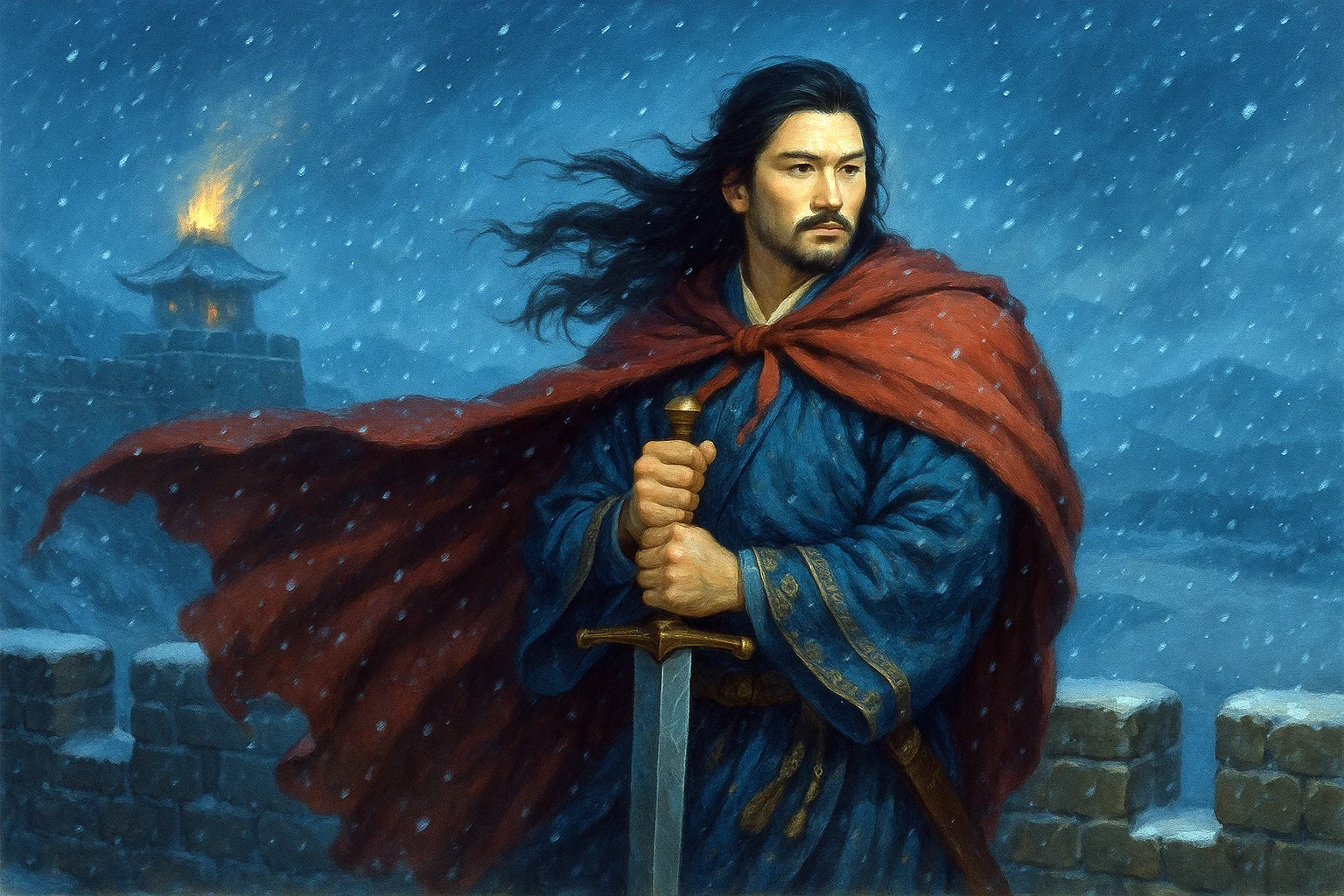
Cen Shen(岑参), 715-770 AD, was a native of Jingzhou, Hubei Province. He studied at Mt. Songshan when he was young, and later traveled to Beijing, Luoyang and Shuohe. Cen Shen was famous for his border poems, in which he wrote about the border scenery and the life of generals in a majestic and unrestrained manner, and together with Gao Shi, he was an outstanding representative of the border poetry school of the Sheng Tang Dynasty.






